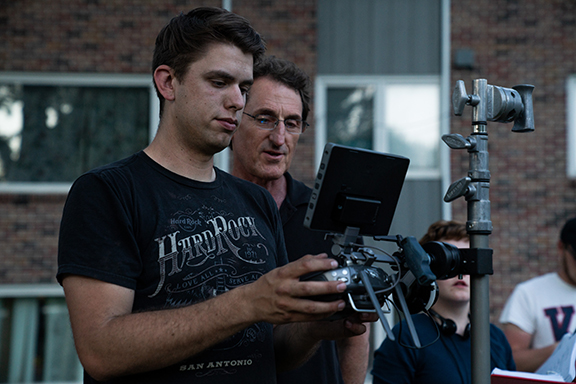
The Carson Film “The Healing of Harman” will have its second, sold-out screening in Lincoln on Tuesday, Dec. 4 at the Mary Riepma Ross Media Arts Center. The film will also have a screening in Los Angeles at the Nebraska Coast Connection Salon on Monday, Dec. 10 for alumni and friends of the Johnny Carson School of Theatre and Film who reside in the Los Angeles area. For more information on that screening, visit http://nebraskacoast.com/.
“The Healing of Harman” is a film about a Kurdish refugee who works in Lincoln, Nebraska, as an interpreter, who meets a mysterious man that asks for help with life and death consequences. While not autobiographical, the film is based on stories told to Executive Producer Julie Uribe by Harman Doski, a local refugee from Iraq.
“I’m humbled that the entire community has embraced this project,” Uribe said. “The goal was always to combine learning, a message with social impact and a great piece of art. It so rarely happens. We’ll let the audience decide the art component, but many students have said they’ve not only learned about movie-making, but more about life. I think that’s just incredible.”
The Carson School Film Series involves a select number of film industry professionals teaming with students and faculty from the Johnny Carson School of Theatre and Film to create a 20- to 25-minute short film. The objective is to provide students with an opportunity to work directly with faculty and outside professionals to create a professional production that is larger and broader in scope than can reasonably be expected of students working independently.
“The Healing of Harman,” filmed May 9-17 in Lincoln with a cast and crew of around 75 students, faculty, alumni and professionals.
“I’m really impressed by what has been pulled together, in terms of the scope of what this production is and can be,” Director Seth Pinsker said during production. “I’ve been really impressed with the talent of the students and the quality of their work. The students are amazing. This is such a good thing that Nebraska is doing for its students.”
Pinsker has received more than 50 major national and international awards for his creative work in film, television, commercials and branded content, including an Academy Award Nomination for Best Short Film (Live Action).
Uribe, an Emmy Award-winning producer with more than 30 years of experience in the television industry who has returned to Lincoln and is a lecturer in the Carson School, served as executive producer of the project and co-wrote the screenplay.
“The Johnny Carson short film is a phenomenal opportunity for students,” she said. “They get to work with Hollywood pros. When they work on their school projects, often times they have an extended amount of time to complete them. One of the ways this is a more realistic experience is that time is an issue.”
The film had a one-week run at a theatre in Los Angeles in September and is being entered into various domestic and international film festivals during this coming year. It is also eligible to be nominated for an Academy Award for Best Short Film.
Elijah Watson, who graduated last December from the film and new media program, came back to work as co-producer and line producer on the film last May.
“I have a pretty high role on the project, so it’s been challenging and rewarding to see the film go from text on a piece of paper to a fully realized production with cameras, actors, directors, sound and production,” he said. “We have more than 70 people working together. I started working alongside a lot of the professionals a couple of years ago [on other projects], but it’s been great to see them work with the current students who maybe haven’t had the opportunity to work on a professional set yet. There are a lot of things you can’t learn in class that they can teach you in a day on set, skills you can’t get from a lecture.”
Ethan Grafton, a film and new media senior, was an editor and worked on sound for the film. He said working on the film increased his awareness of the plight of refugees, especially in the Lincoln area.
“Looking back, I'm incredibly glad to have worked on a film that will hopefully have a similar effect on its audience,” Grafton said. “The specifics of some issues are difficult to nail down without talking to those directly affected by them. During production and post-production on ‘Harman,’ I had the opportunity to speak at length with several refugees, and that made the experience of telling the story of one of them much more profound.”
Uribe said the experience has had a similar profound effect on her as well.
“I’ve done everything in my career from covering the Columbine shooting to Vietnam POWs. I’ve also worked on a lot of lighter fare, including game shows and reality shows. You don’t always get to hit a home run from the message,” Uribe said. “My hope is that the students see that when you have an opportunity to tell stories that can move people, grab it. Do whatever it takes to be a part of that. That’s what happened to me here. I’ve met people I wouldn’t have normally met, and then I’ve been able to share those relationships.”
“The Healing of Harman” is the third film in the Carson School Film Series, sponsored by the Hixson-Lied College of Fine and Performing Arts and the Johnny Carson School of Theatre and Film. The first film, “Vipers in the Grass,” was completed in 2010. The second film, “Digs,” was completed in 2013.
“As the writer and executive producer of this film, it’s been a life-changing experience for me,” Uribe said. “I hope it will be for the students as well.”